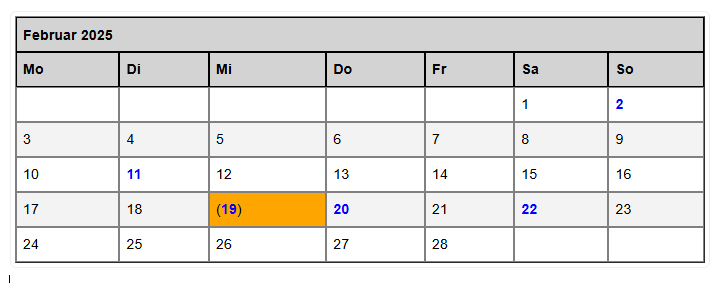Well, did I mention, I fell in love with LUA?
So I created a new version of the calendarscript in lua.
As I’m using html directly this time (instead of markdown output) it looks better (IMO) and you are able to style it somewhat.
Please keep in mind, tha tyou have to use the latest Silverbullet EDGE.
Screenshot:
For now only the actual day is marked and every day for which a page exists is displayed a bit different.
To display the calendar on a page, use this command:
${generate_calendar(year, month)},
e.g.: ${generate_calendar(2025, 2)}
(actual date is displayed, if year and/or month left empty)
To “install” it, simple create a new page (e.g. in your scripts subdirectory) with this content:
```space-lua
function generate_calendar(year, month)
-- use actual date, if nothing given as parameter
if year == nil or month == nil then
year = tonumber(os.date("%Y"))
month = tonumber(os.date("%m"))
end
local days_in_month = {31, 28, 31, 30, 31, 30, 31, 31, 30, 31, 30, 31}
local month_names = {"Januar", "Februar", "März", "April", "Mai", "Juni", "Juli", "August", "September", "Oktober", "November", "Dezember"}
local day_names = {"Mo", "Di", "Mi", "Do", "Fr", "Sa", "So"}
-- Check for leap year
if (year % 4 == 0 and year % 100 ~= 0) or (year % 400 == 0) then
days_in_month[2] = 29
end
local days = days_in_month[month]
-- Get the first day of the month (1 = Sunday, 2 = Monday, ..., 7 = Saturday)
local first_day = tonumber(os.date("%w", os.time{year=year, month=month, day=1}))+1
-- Adjust first day to start from Monday (1 = Monday, ..., 7 = Sunday)
first_day = first_day - 1
if first_day == 0 then
first_day = 7
end
local html = "<table border='1'>\n"
html = html .. "<tr><th colspan='7'>" .. month_names[month] .. " " .. year .. "</th></tr>\n"
html = html .. "<tr>"
for _, day_name in ipairs(day_names) do
html = html .. "<th>" .. day_name .. "</th>"
end
html = html .. "</tr>\n"
local day = 1
local started = false
local journalfilename =""
local cellcontent =""
for week = 1, 6 do
html = html .. "<tr>"
for weekday = 1, 7 do
if not started and weekday == first_day then
started = true
end
if started and day <= days then
-- define Jounral directory and Filenames
journalfilename = "Journal/" .. year .. "-" .. leadingzero(month) .. "-" .. leadingzero(day) .. "_" .. day_names[weekday]
if space.fileExists(journalfilename .. ".md") then
cellcontent = "<b><a href=\"" .. journalfilename .. "\" class=\"mark\" data-ref=\"" .. journalfilename .. "\">" .. day .. "</a></b>"
else
cellcontent = "<a href=\"" .. journalfilename .. "\" data-ref=\"" .. journalfilename .. "\">" .. day .. "</a>"
end
-- mark today
if day == tonumber(os.date("%d")) and month == tonumber(os.date("%m")) and year == tonumber(os.date("%Y")) then
html = html .. "<td class=\"mark\">(" .. cellcontent .. ")</td>"
else
html = html .. "<td>" .. cellcontent .. "</td>"
end
day = day + 1
else
html = html .. "<td></td>"
end
end
html = html .. "</tr>\n"
if day > days then
break
end
end
html = html .. "</table>"
return {
html=html;
display="block";
cssClasses={"calendartable"}
}
end
local function leadingzero(number)
return (number < 10 and "0" .. number) or tostring(number)
end
Styles:
```space-style
.calendartable {
/* color: blue; */
border-collapse: collapse;
width: 50%;
}
.calendartable th {
border: 1px solid black;
padding: 3px;
text-align: left;
background-color: lightgray;
}
.calendartable td {
border: 1px solid gray;
padding: 3px;
text-align: left;
}
.calendartable td.mark {
background-color: orange;
}
.calendartable a {
text-decoration-line: none;
color: black;
}
.calendartable a.mark {
text-decoration-line: none;
color: blue;
}
EDIT:
This script and future editions will is available on github from now on:
